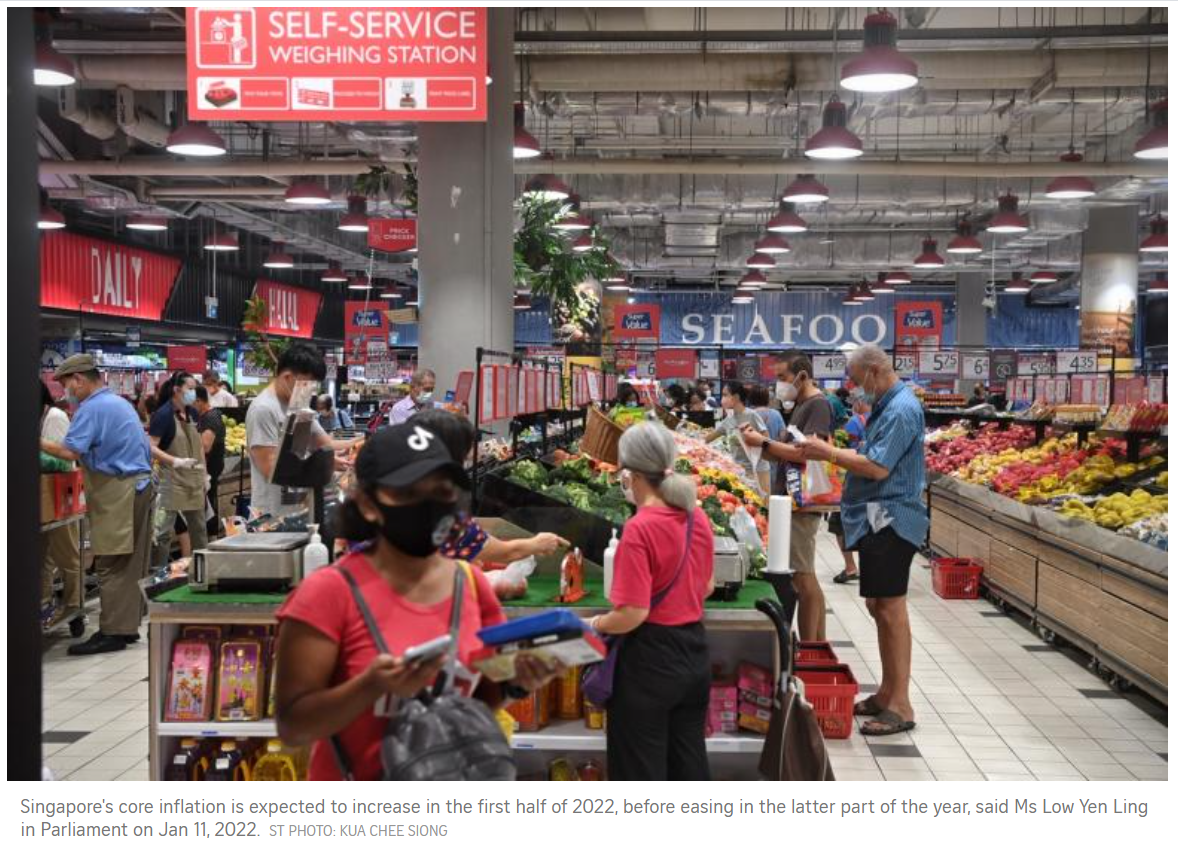Singapore does not expect persistent, accelerating inflation; measures in place to mitigate impact: Low Yen Ling
SINGAPORE – Singapore does not expect persistent, accelerating inflation ahead, and cost pressures are expected to ease gradually over the course of the year, said Minister of State for Trade and Industry Low Yen Ling in Parliament on Tuesday (Jan 11).
Addressing several MPs’ questions on inflation concerns and the impact on Singapore’s economy and consumers, she said that the Ministry of Trade and Industry (MTI) and the Monetary Authority of Singapore (MAS) expect inflationary pressures arising from external factors to be temporary.
Singapore’s headline inflation rose to 3.8 per cent in November last year, while core inflation – which she said was a more useful gauge of rising prices, as it excludes accommodation and private road transport costs – came in at 1.6 per cent the same month.
Several global factors, such as energy prices, food supply constraints and supply bottlenecks in transport hubs, are behind the rise of inflation, Ms Low said, noting how other countries and regions such as the United States, the euro zone and South Korea are also grappling with inflation.
She said that in the near term, Singapore is likely to continue facing external cost pressures, due to factors such as elevated global energy prices and bottlenecks in global transportation.
Besides external cost pressures, Singapore’s domestic wage growth is likely to continue to improve as labour demand strengthens on the back of improving economic activity, Ms Low said. At the same time, as the Covid-19 situation stabilises, consumer demand should improve, she added.
With these factors in mind, Singapore’s core inflation is expected to increase in the first half of 2022, before easing in the latter part of the year, Ms Low said, adding that it could average within the upper half of the official forecast range of 1 per cent to 2 per cent for the full year.
Headline inflation is projected to average 1.5 per cent to 2.5 per cent this year, following the expected 2.3 per cent in 2021.
“MTI and MAS will carefully monitor price trends over the next few months of the year closely, before revising the forecasts if necessary,” Ms Low said.
While the small and open nature of Singapore’s economy constrains how much the Government can shield Singaporeans from inflationary pressures, it is sparing no effort to lessen its impact, she added.
To this end, the Government has a multi-pronged strategy to mitigate inflationary pressures, she said.
First, it strives to keep the Singapore economy competitive so that it can continue to create good jobs to bring sustainable wage growth for Singaporeans. She noted that Singapore’s strong economic recovery in 2021 helped to ensure that resident workers saw real wage growth in 2021 after accounting for inflation.
Real median income growth of full-time employed residents in 2021 was positive at 1.1 per cent. Real income also rose by 4.6 per cent for lower income residents at the bottom 20th percentile, Ms Low cited.
Second, the MAS tightened monetary policy last October in light of imported and domestic cost pressures. Since then, the Singapore dollar has strengthened, which will help reduce the Singapore dollar cost of imports and shield Singaporeans from some of the external cost pressures.
“For instance, the Singapore dollar has appreciated significantly against the currencies of the country’s major food sources over the longer term, and this has moderated the pass-through effects of external inflationary pressure,” Ms Low said.
Third, the Government carefully manages domestic supply-side constraints, such as the supply of industrial and commercial space, to help rein in business rental costs that may translate to higher consumer prices. Policy measures such as the Jobs Support Scheme have also alleviated labour costs, she added.
Fourth, Singapore’s diversification of food import sources helps to ensure that prices of food supplies remain competitive and reduces its vulnerability to large price fluctuations globally, Ms Low pointed out.
The Republic’s domestic non-cooked food prices saw a relatively smaller increase of 1.6 per cent year on year between July and November 2021, compared with the 30 per cent year-on-year rise in global food commodity prices over the same period.
Fifth, the authorities work closely with industry partners to ensure that the prices of daily necessities and food items are competitive and affordable.
Ms Low cited how some businesses are going out of their way to help consumers, such as by providing an allocated amount of food for the likes of low-income families, the unemployed and the elderly to redeem.
Sixth, targeted assistance is provided to lower-income Singaporeans who need support for basic living expenses through schemes such as the permanent GST (goods and services tax) Voucher scheme.
Addressing questions from Mr Ang Wei Neng (West Coast GRC) and Ms Jessica Tan (East Coast GRC) on how the Government is helping businesses manage cost increases, which could in turn be passed on to consumers, Ms Low noted that government agencies are working with companies to help them better cope with supply chain disruptions, and firms can tap schemes under Enterprise Singapore such as the Enterprise Financing Scheme, which helps small and medium-sized enterprises obtain trade financing.
The Government has also provided support to firms for manpower costs, she added.
Ms Low also reiterated that the Government has taken steps against profiteering by businesses and to promote price transparency, such as through its Price Kaki app and consumer watchdog Competition and Consumer Commission of Singapore.
Source: https://www.straitstimes.com/singapore/politics/spore-does-not-expect-persistent-accelerating-inflation-measures-in-place-to-mitigate-impact-low-yen-ling


 Thailand
Thailand




